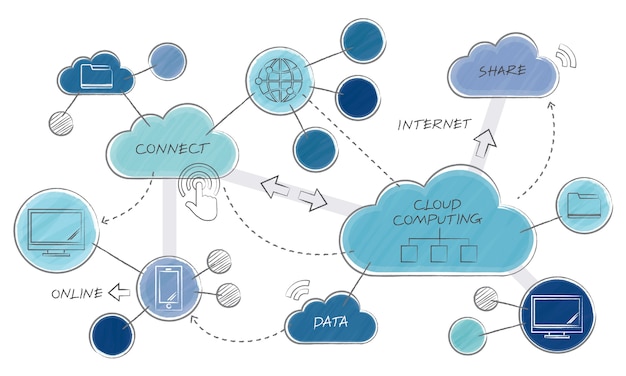The move in the global workforce towards remote work is facilitated by cloud computing, which has become an important technology. Cloud computing solutions are perfect for distant working situations because of their efficiency, scalability, and flexibility. Professionals wishing to begin or grow in this sector, particularly with an emphasis on AWS (Amazon Web Services, must have a clear path.
Cloud computing is the on-demand delivery of IT resources over the Internet with pay-as-you-go pricing. It shifts the approach of an enterprise in such a way that it can arrange the sources when required; it does not have any necessity to hold up with the important physical infrastructure. It promotes remote work, allowing workers to access their working environment from any place that has an internet connection.
Cloud computing-related remote working makes use of these features to provide flexible work schedules. Workers may work remotely, communicate with each other instantly, and safely access files and programs via cloud computing systems. A lot of physical infrastructure, such as data centers and internal computers, can be expensive to operate. However, cloud computing eliminates this necessity. It also increases efficiency, security, scalability, and teamwork.
Information security is a major concern when employees are working remotely. Cloud computing solutions frequently include built-in security protections, but it’s necessary to understand and execute best practices to protect sensitive information. Data protection policies in cloud computing place a high value on encryption. Encryption converts sensitive data into an incoherent format that can only be viewed using the associated encryption key. To prevent unwanted access, data must be encrypted before it is stored on the cloud.
Road Map for Cloud Computing and AWS
-
Foundational Knowledge:
Before entering cloud computing space, it requires a certain level of knowledge about IT. Core computing skills and familiarity fundamental principles of computer science, networking, and operating systems will be necessary. As well, fair understanding of the TCP/IP, DNS and HTTP protocols, and minimum skills in server handling should be established. Virtualization also falls under core knowledge, so at least try to learn something about virtual machines, containers, or hypervisors. Virtualization is possibly the most common characteristic of cloud computing; it refers to the capacity for many virtual instances to run on a single physical server. Lastly, it would be good to understand some basic networking concepts like IP addresses, firewalls, and VPNs. They will, of course, come in handy when administrating cloud resources.
-
Cloud Computing Basics:
Start your learning with the core concepts of cloud computing.
- Cloud Service Models: IaaS, PaaS, and SaaS are three fundamental cloud services.
- Deployment Models: There are several kinds of cloud deployment models: these include private, public, and hybrid clouds.
- Major Cloud Providers: Familiarize yourself with the major cloud service providers such as Google Cloud Platform (GCP), Microsoft Azure, and Amazon Web Services (AWS). This course is mainly based on AWS, so you will just be good to go if you have some fundamentals with other providers.
-
Get Relevant Certifications:
A certification signifies that you have adequate knowledge about cloud computing. AWS Certified Cloud Practitioner: An entry-level certification, it tells you the basics of AWS and cloud computing. It is the right certification for beginners. AWS Certified Solutions Architect – Associate: Best suited for those who need to design and implement scalable systems using Amazon Web Services; it includes all the best practices in architecture and services at the basic level.
AWS Certified SysOps Administrator, Associate: This one is an operations-centric certification and is suitable for candidates who wish to professionally handle and administer AWS infrastructure. One other consideration that comes out heads and shoulders above the rest is the AWS Certified Solutions Architect Professional, not on an entry-level tier because this course delves deep into advanced complex architectural principles and solutions. The Certification for the AWS Certified DevOps Engineer Professional is ideal for those who would like to enable automation of application deployment and operations in the AWS platform. Finally,
-
Gain practical experience:
One requires hands-on experience, which he achieves by practicing, to learn cloud computing techniques. There are various approaches to acquire hands-on experience, and the free tier of AWS is updated to allow you to test hundreds of its services freely. This has been really great in understanding without spending a single buck. Just ponder a moment using an online lab or a sandbox; take, for instance, Qwiklabs and Cloud Academy.
These are real labs or sandbox environments that work on real-world scenarios. Personal projects will also help someone be practically exposed. Employees working on projects on application deployment, database configuration, or cloud infrastructure management actually gain practical, hands-on experience. This experience is of invaluable importance in the factor of getting to understand real-time problems and their solutions.
-
Studying the Information Security:
Unquestionably, your prime concern while being employed would always be security while working remotely. Make sure you understand the best practices to keep your data safe. Learn how your data should be encrypted, how the access to it should is controlled, and how the Identities are managed. AWS has a plethora of services in the area of Security management like AWS IAM, AWS Identity and access Management, or AWS KMS. Also do research on compliance legislation, which includes GDPR, HIPAA, and PCI-DSS. These laws are important in ensuring that your cloud infrastructure is compliant with some of the basic needs. You should also understand how to monitor and respond to security incidents. There are tools developed by AWS: CloudTrail and AWS config for monitoring and managing security events.
-
Soft Skills for Remote Work:
Soft skills are very important on their own as are technical skills when working remotely. Communication is of great importance while working remotely; hence, you need to have impeccable communication skills. Ensure that you can appropriately articulate your thoughts and cooperate with the team in a porky W of the mixture. Working from requires an ample amount of self and time management; therefore, you must have first-rate time management skills as well. Goals need to be set, and habits to get it done are to be cultivated. And surely, last but not least, the ability to solve problems in a remote working environment; a troubleshooter is to be in place. The ability to solve problems for self is pretty significant.
-
Stay Updated and Networked:
The cloud computing industry is always expanding, you need to learn how to stay updated in order to be relevant in the field. To be updated with the latest cloud computing news, learn continuously, follow industry news and blogs, and attend webinars. Another area you could focus on is networking, because it is rewarding and will open ways LONG. Be active in online communities, attend meet-ups, or find a way to work with your industry peers. You learn a lot from meet-up talks and then reading the follow-up conversation after the meet-up. AWS Community Forums and LinkedIn are awesome for this. As you level up, go for the high-end certifications or specializations, such as machine learning, big data, or security.
In a nutshell, successful remote work with cloud computing, in particular with AWS, would need an honest learning and skills development strategy. Start from core IT education path to your desired certification and experience. Additionally, improving your capacity and assessment in handling remote work can be done by concentrating on issues concerning information security, possible soft skills, and dynamism that is happening in the industry.
By following this roadmap, you would be able to become a proficient, agile specialist in the rapidly evolving field of cloud computing, get the benefit from remote work, and contribute to any company’s cloud strategy.

 Studying the Information Security:
Studying the Information Security:



